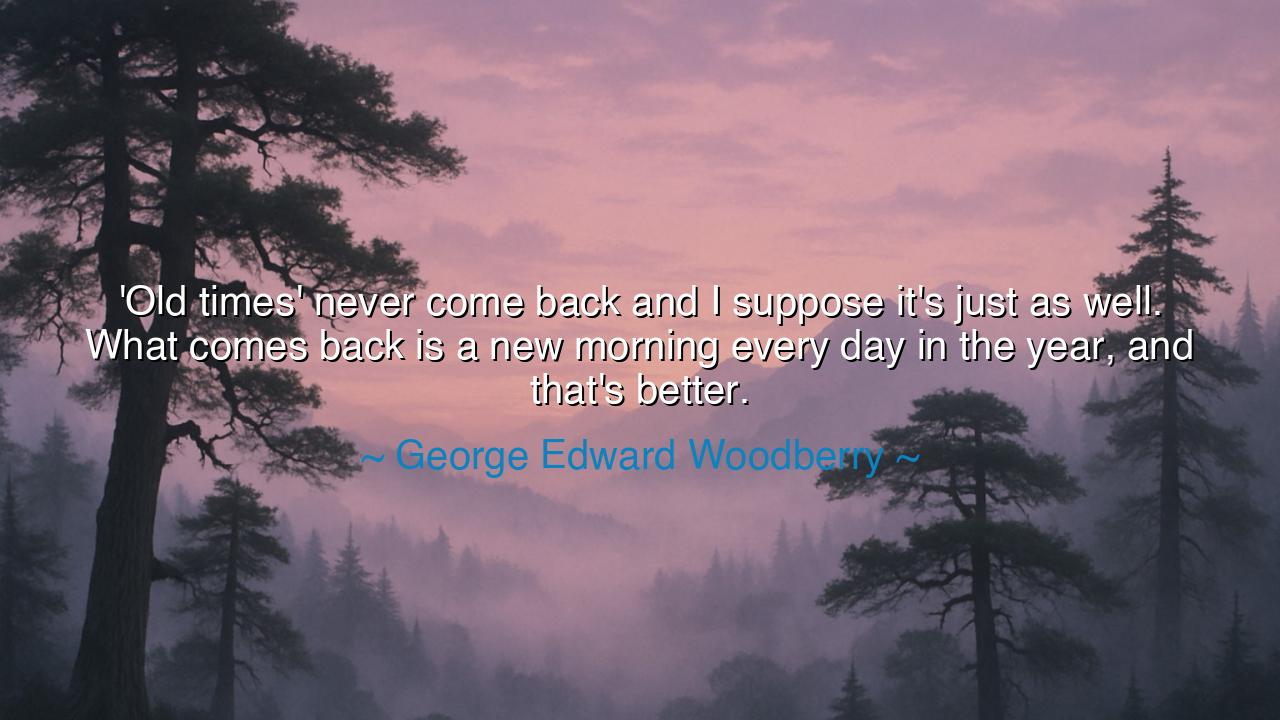
'Old times' never come back and I suppose it's just as well.
'Old times' never come back and I suppose it's just as well. What comes back is a new morning every day in the year, and that's better.






The words of George Edward Woodberry are like sunlight breaking through the mist of nostalgia: “‘Old times’ never come back and I suppose it’s just as well. What comes back is a new morning every day in the year, and that’s better.” In this reflection lies the ancient truth of impermanence, of renewal, and of the futility of clinging to what has passed. It is a call to release the past with gratitude and to embrace the ever-giving gift of the present.
He begins with the reminder that the “old times” never return. This is a truth that every human heart resists, for we long for the innocence of youth, the warmth of vanished friendships, the glory of triumphs long past. Yet Woodberry tells us plainly that these moments are gone. And in their going lies mercy: for if we could truly return, we might remain forever trapped, clinging to echoes instead of living in the strength of now. The past, sacred though it is, is not meant to be relived, but remembered.
What we are given instead is “a new morning every day in the year.” Here, the wisdom unfolds: life does not return us to what was, but offers instead the possibility of what may yet be. Each dawn is renewal, a clean page written by the sun across the earth. While the past is unchangeable, the morning is a promise that life’s river still flows, that possibility still breathes, that joy and meaning can still be discovered. The true gift is not in reliving yesterday but in receiving today.
History offers its witness. After the American Civil War, countless veterans longed for the days before bloodshed, for the innocence of their youth, for the comrades they had lost. Yet those “old times” never returned. Instead, they were given the morning of reconstruction—a chance to rebuild, to plant new seeds, to forge a new nation. Many resisted, clinging to shadows, but those who embraced the morning—who accepted renewal rather than nostalgia—became builders of schools, leaders of peace, and voices of progress.
This is not to deny the ache of memory. Nostalgia is powerful, and it carries sweetness. But to dwell only upon it is to miss the sunrise while staring at yesterday’s sunset. Woodberry teaches that wisdom is found in gratitude for what has passed, but joy is found in welcoming the fresh light that falls upon us each day. The old times cannot be touched again, but the new morning can be lived fully.
The lesson is clear: do not chain yourself to what cannot return. Do not waste your strength in longing for “old times.” Instead, rise each day as though it is the first, as though all is possible. Meet the dawn with courage, with discipline, with hope. The one who clings to the past becomes brittle; the one who embraces the morning becomes eternal.
Therefore, children of the future, remember this: every day is a new morning, and in it lies a gift greater than the past could ever give. The “old times” are gone, but they have given birth to today. Honor them by living now with fullness, with bravery, with love. For each dawn is better than the illusion of return—it is not memory, but life itself, renewed again and again, until our last sunrise.
Thus, Woodberry’s words shine as a teaching: let the old times rest, and greet the morning as your true inheritance. For in the rising of the sun each day is the promise of life renewed, and that is better than anything that has already passed.






AAdministratorAdministrator
Welcome, honored guests. Please leave a comment, we will respond soon